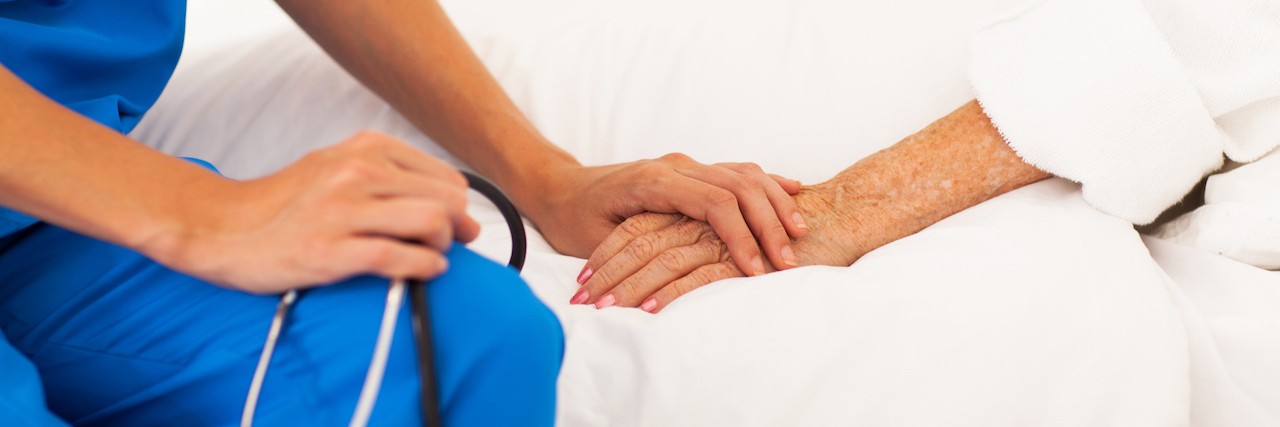I’m going to tell you a little about myself. I am 19 years old. I love to swim and surf. I have a brother with disabilities and I grew up helping him. This made me realize I love helping people and making a difference, which is why I decided I wanted to become a nurse. I am currently enrolled in a nursing program at a four year university and I love it. One more thing about myself: I have scars.
I have a variety of mental illnesses: depression, social anxiety disorder (SAD), generalized anxiety disorder (GAD) and attention-deficit/ hyperactivity disorder (ADHD). I also self-harm. I have been seeing a counselor and a psychiatrist for about three years to work on it. I am not proud of my scars; however, I am not ashamed either. They make me who I am. Most of the time, I forget they are even there.
During one of my classes, we were performing a health assessment competency on a peer. Part of the requirements for this competency was you had to wear the nursing uniform: red scrub pants and a red short sleeve scrub top. There is an optional long sleeve white shirt as well. I decided not to wear it because the classroom was hot. I noticed my professor looking at my arms during this activity. I figured she saw the scars on my arms, but I didn’t think much of it. I knew my professor was a nurse practitioner. I figured she had seen plenty of scars before working as a nurse and just wanted to see if my scars were healing normally.
A few days later, I received an email saying she wanted me to meet her in her office. I went to her office to meet with her, thinking she was going to ask me if I was OK and if there was anything I wanted to talk about, the usual concerned teacher talk.
I was wrong. She told me she felt it was “inappropriate for patients to see my scars” and told me I should talk to all my professors about allowing me to always wear my white long-sleeve shirt. She also said the psychiatric patients would see it as a “sign of weakness.” I was shocked, hurt, sad and confused. I left her office in tears.
I didn’t know what to think. I went to talk to one of my friends to see if she had any advice. I told her what happened and her response was, “I wouldn’t trust you to be my nurse. I would walk out of the office if I saw your scars. You are not mentally competent enough to be a nurse.”
I went in my room and cried. I questioned whether she was right. I asked myself am I mentally competent enough to be a nurse? I thought they were right. I told myself I should just drop out of the nursing program. I felt myself slipping back into my depression. I didn’t try to fight it either. I had nothing. I felt worthless and defeated. The one thing I thought I was good at, a professor and one of my best friends told me I shouldn’t do.
Then, I had a moment of realization. I could continue to lay in my bed and feel sorry for myself or I could get up and prove people wrong. Would you tell a nurse who was also a burn victim to cover her (or his) scars up? I don’t think so. So why do I have to cover my scars up? What is the difference?
A scar is a scar.
I want to be a nurse more than ever now. I realized I can use my scars to my advantage. I can bandage a patient’s self-harm wounds and tell them they can and will make it through this. If they don’t believe me, then I will roll up my sleeve and show them my scars. I can comfort a patient who has just attempted suicide. I can tell them I know what it is like to feel like suicide is the only answer. If they don’t believe me, then I will roll up my sleeve and show them my scars. My scars are not a sign of weakness. My scars do not make me incompetent. My scars make me, me.
To anyone who thinks they can’t do something because of their mental illness, I am here to say you can. Don’t let anyone tell you because of your scars you can’t do something. Don’t let anyone tell you your mental illness makes you “incompetent.” Because guess what, you are anything but that.
You are strong. You fight a battle in your mind on a daily basis. You are anything but weak. You are a survivor.
If you or someone you know needs help, visit our suicide prevention resources page.

